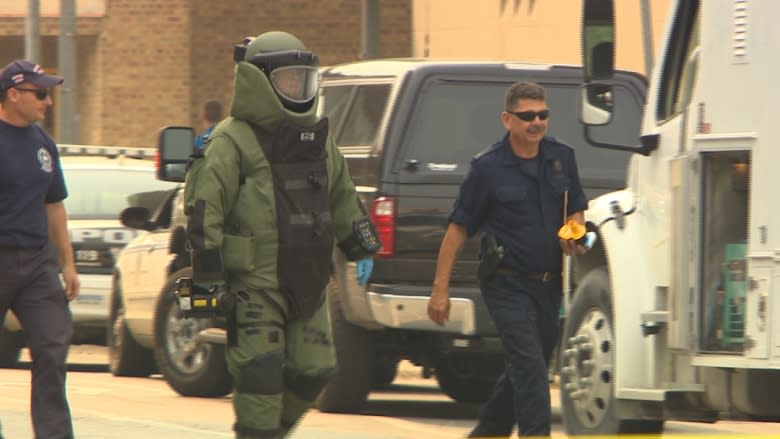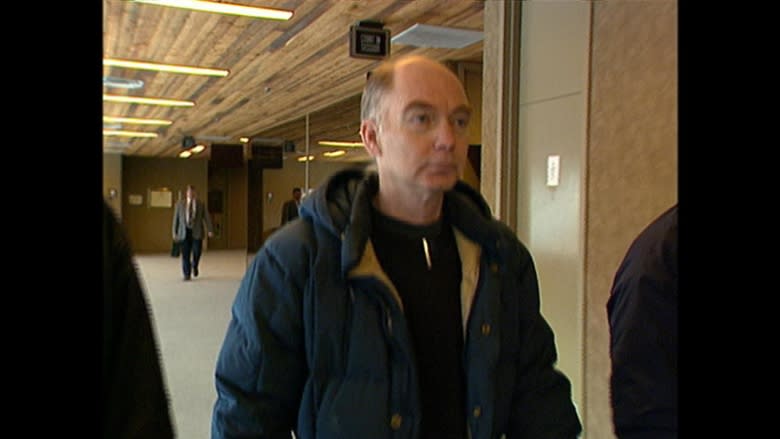Canadian bomb threats are almost always hoaxes, but still take police time
The news that a number of bomb threats against some Canadian schools, universities and colleges earlier this week were all hoaxes doesn't come as a surprise to security expert Dr. Steve Albrecht.
He argues there's a critical difference in the intentions of people who make bomb threats and actual bombers.
"The bomb threat maker doesn't typically have any desire to blow up the building, the bomber does. In fact, the bomber does not want warning and does not want his device to be found, whereas the bomb threat maker knows there isn't a device. They just like being disruptive," said the San Diego-based school and workplace violence expert.
Multiple threats on the same day
The threats resulted in the evacuations of all schools and universities on Prince Edward Island., as well as three college campuses in Nova Scotia, on Wednesday. A similar threat in Winnipeg on the same day didn't result in any lockdowns or evacuations. On Thursday, schools in three regions of Nunavut were closed due to a bomb threat, but reopened after lunch.
In less than a week this summer, WestJet and Air Canada were hit with a total of six bomb threats. All were hoaxes.
Albrecht is a former police officer and he says there's a lack of understanding from just about everybody about the motives of bomb threat makers and bombers.
"There's a vast difference in the goals for these two people. The problem I think is first responders and people on the outside, in the media and the public, think they are the same," he said.
Albrecht points to people like the Unabomber, Timothy McVeigh, and the brothers behind the Boston Marathon bombings as typifying bombers in that they carried out the attacks without providing advance notice to authorities.
Bomb threat numbers
It's difficult to determine how many bomb hoaxes the police must deal with on a daily or yearly basis. Statistics Canada, which gathers crime statistics for its Uniform Crime Reporting Survey, doesn't have a separate category for threats. Instead, if the threat is a hoax, it will be classified as mischief and grouped in with all other mischief-type offences.
The jail sentences for mischief under the Criminal Code range from a fine to life imprisonment.
In Halifax since 2010, Halifax Regional Police have responded to 67 bomb threats. Police said a Freedom of Information request would be needed to figure out how many of those instances were hoaxes or resulted in charges.
The Loki 7 P.E.I. bomber
There's at least one recent instance in Canada where a bomb was found after a person made a threat. Roger Charles Bell, a P.E.I. man known as the Loki 7 bomber, carried out a string of bombings. In 1995, he phoned police with a tip about one he placed at a Charlottetown propane station, which they found and removed.
Law enforcement officials say assessing the credibility of a bomb threat is difficult.
"There's no question — the vast majority of these types of threats are not credible. However, in the early stages, it's very difficult to say definitively that the threat is not credible," said P.E.I. RCMP Staff Sgt. Kevin Baillie.
"It's a very difficult decision to make and I think in the vast majority of cases, it's prudent to err on the side of caution. But no matter what way you go, you're opening yourself up to criticism."
Determining threat validity
Some of the things police look at in determining in the seriousness of the threat are whether they know the identity of the threat maker. If that is known, police can look into the person's personality and background, says Glenn Woods, a former RCMP criminal profiler who now runs a behavioural analysis, investigation and training company in Ottawa.
Even if the person's identity isn't known, he says a lot of information can be inferred from how the person communicated the threat by analyzing things like grammar and phrasing.
If the geographical origin of the threat can be located, that will help determine whether the act can even be carried out.
"If the person is making this threat in P.E.I. and Halifax, the likelihood of one individual carrying out the threat as it was described in multiple locations across a country was effectively impossible," said Winnipeg Police Service spokesman Const. Rob Carver about the Wednesday threats.
Why do people make bomb threats?
The motivations behind people placing bomb threats vary.
"Usually people who make threats are in a position of weakness. They might have a beef or a complaint and are trying to bring attention to it," said Woods.
Experts say it could be a disgruntled employee or former employee, an angry customer, a mentally ill person, a student who just wants to get out of writing a test or someone looking to pull off a prank.
For police, responding to bomb threats has "quite a draw" on its resources, says Insp. Reid McCoombs with the Halifax Regional Police.
A police response to a bomb threat could include patrol officers, a K-9 unit, an explosives demolition team, forensics people and traffic officers.
Journalism ethics
David Swick, the associate director of the School of Journalism at the University of King's College in Halifax, says journalists have a duty to report the news of a bomb threat, but there is a danger if threats aren't reported in a well-thought-out way.
"It might scare everyone. It might have your whole town or society so beaten down by getting fearful news, it turns into a cry-wolf situation where when bad stuff actually happens, nobody actually believes it," said Swick.
Threat of copycats
He says covering bomb threats could also lead to copycat acts.
Swick says the words journalists use are critical and they should avoid terms like chaos, mayhem and terror. Their tone is also important.
When covering the threats, journalists should dig deeper and ask questions about how difficult it is to identify who is making the threats, how often threats are made and whether people are prosecuted.
"All of that kind of journalism would help people a lot more by giving them real, valuable concrete information about a difficult situation," he said.




